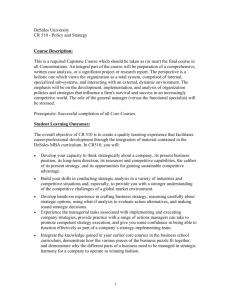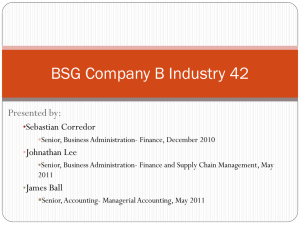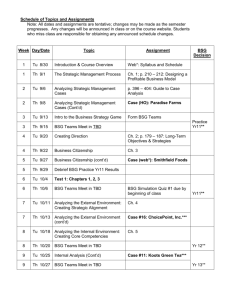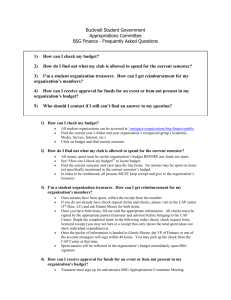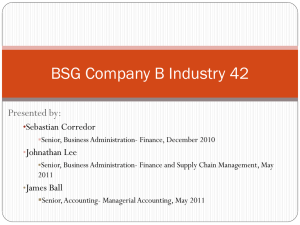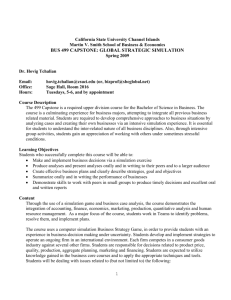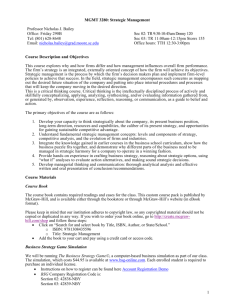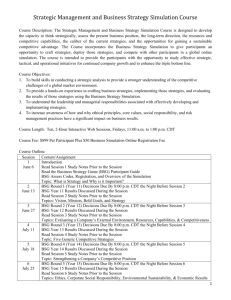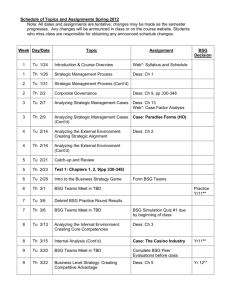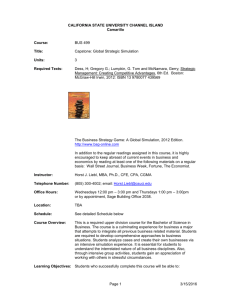MGT 4950: STRATEGIC MANAGEMENT Fall 2013 Section 01: 2:00
advertisement
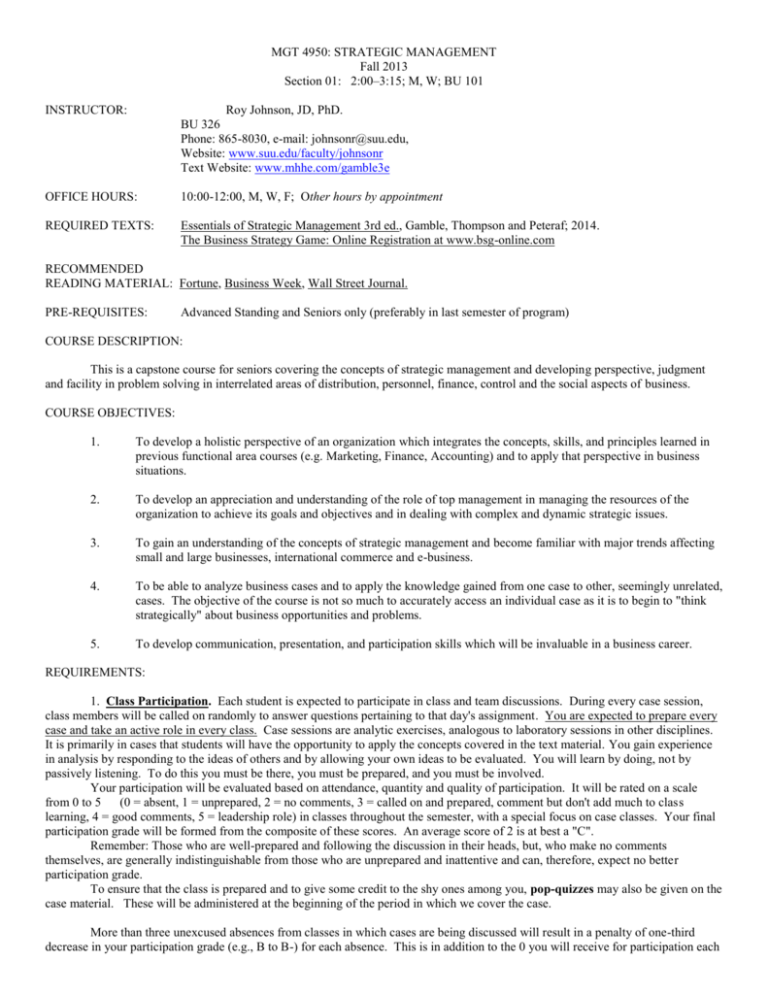
MGT 4950: STRATEGIC MANAGEMENT Fall 2013 Section 01: 2:00–3:15; M, W; BU 101 INSTRUCTOR: Roy Johnson, JD, PhD. BU 326 Phone: 865-8030, e-mail: johnsonr@suu.edu, Website: www.suu.edu/faculty/johnsonr Text Website: www.mhhe.com/gamble3e OFFICE HOURS: 10:00-12:00, M, W, F; Other hours by appointment REQUIRED TEXTS: Essentials of Strategic Management 3rd ed., Gamble, Thompson and Peteraf; 2014. The Business Strategy Game: Online Registration at www.bsg-online.com RECOMMENDED READING MATERIAL: Fortune, Business Week, Wall Street Journal. PRE-REQUISITES: Advanced Standing and Seniors only (preferably in last semester of program) COURSE DESCRIPTION: This is a capstone course for seniors covering the concepts of strategic management and developing perspective, judgment and facility in problem solving in interrelated areas of distribution, personnel, finance, control and the social aspects of business. COURSE OBJECTIVES: 1. To develop a holistic perspective of an organization which integrates the concepts, skills, and principles learned in previous functional area courses (e.g. Marketing, Finance, Accounting) and to apply that perspective in business situations. 2. To develop an appreciation and understanding of the role of top management in managing the resources of the organization to achieve its goals and objectives and in dealing with complex and dynamic strategic issues. 3. To gain an understanding of the concepts of strategic management and become familiar with major trends affecting small and large businesses, international commerce and e-business. 4. To be able to analyze business cases and to apply the knowledge gained from one case to other, seemingly unrelated, cases. The objective of the course is not so much to accurately access an individual case as it is to begin to "think strategically" about business opportunities and problems. 5. To develop communication, presentation, and participation skills which will be invaluable in a business career. REQUIREMENTS: 1. Class Participation. Each student is expected to participate in class and team discussions. During every case session, class members will be called on randomly to answer questions pertaining to that day's assignment. You are expected to prepare every case and take an active role in every class. Case sessions are analytic exercises, analogous to laboratory sessions in other disciplines. It is primarily in cases that students will have the opportunity to apply the concepts covered in the text material. You gain experience in analysis by responding to the ideas of others and by allowing your own ideas to be evaluated. You will learn by doing, not by passively listening. To do this you must be there, you must be prepared, and you must be involved. Your participation will be evaluated based on attendance, quantity and quality of participation. It will be rated on a scale from 0 to 5 (0 = absent, 1 = unprepared, 2 = no comments, 3 = called on and prepared, comment but don't add much to class learning, 4 = good comments, 5 = leadership role) in classes throughout the semester, with a special focus on case classes. Your final participation grade will be formed from the composite of these scores. An average score of 2 is at best a "C". Remember: Those who are well-prepared and following the discussion in their heads, but, who make no comments themselves, are generally indistinguishable from those who are unprepared and inattentive and can, therefore, expect no better participation grade. To ensure that the class is prepared and to give some credit to the shy ones among you, pop-quizzes may also be given on the case material. These will be administered at the beginning of the period in which we cover the case. More than three unexcused absences from classes in which cases are being discussed will result in a penalty of one-third decrease in your participation grade (e.g., B to B-) for each absence. This is in addition to the 0 you will receive for participation each time you are absent. If circumstances require you to miss class you may, with the consent of the instructor, make up the class by turning in comprehensive written answers to the study questions for that case. These will be due the following class period. 2. Examinations. There will be three exams in the course of the semester. Students are responsible for material covered in lectures, readings, and discussions. The exams will include short-answer, multiple choice, and essay questions and will test both your knowledge of the conceptual material and your ability to apply that knowledge. The ETS Field exam (or Princeton exam) is administered to all graduating business majors. It will test your knowledge of all areas of the business major (e.g., accounting, economics, finance, management, marketing...). This exam is used nationally to rank the quality of different business schools. Traditionally, SUU students have done very well on this exam, averaging in the top 10% for the last five years. The exam will be administered in the testing center during the semester. This will count as your final exam. However, while taking this exam is a requirement of this course (if you do not take it you do not pass), how well you do on the exam does not affect your course grade. 3. Team Case Analysis/Competition. The class will be divided into teams of three or four students, each of which will be responsible for one formal case analysis and presentation. The team will play the role of outside consultants and will be in competition against another group. Details are provided in the appendix. To ensure that every member actively participates in the group projects and that the work and learning are equitably divided, each team member will evaluate the contributions of each other member in his/her group to the presentation. These evaluations will then be used to adjust the final group grades for each member. If every member participates equally (the ideal and the most common situation) then each member will receive the grade awarded the whole group, otherwise, the individual grades may be adjusted either up or down. It is each group member's responsibility to communicate with the other group members to ensure that the work is being equitably distributed. No group member should be surprised by these evaluations. 4. Simulation: The Business Strategy Game. Each team will form a company and will make strategic decisions to lead that company in a business simulation in competition with other teams in the class. EVERY CLASS MEMBER MUST register on-line for the simulation at http://www.bsg-online.com . Once registered, every class member should either read from the screen or print and read a personal copy of the “Player’s Guide”. Once you have finished reading the Player’s Guide, you may complete On-Line Quiz #1. This is a timed – open book – quiz: point value – 5% of your simulation grade. Your group will submit decisions each week for 10 weeks. Your grade for this exercise will be scored in terms of your company’s ending performance on key business measures (EPS 20%, ROE 25%, Stock Price 20%, Credit Rating 20%, and Image Rating 15%). Further details will be provided in a player’s manual and a practice session to be held in class. Individual grades will be adjusted based on group feedback; make sure you are doing your share. The groups will also make a short (c.a., 5 minute) presentation on their efforts. These should cover why they ended up where they did, what their strategy was, and what they would do differently had they to do it over again. BSG Grading (based on final score—including quiz score and group evaluations): Score Grade Score Grade Score Grade Score Grade Score Grade 110-109 100 88-87 89 68-67 79 48-47 69 28-26 59 108-107 99 86-85 88 66-65 78 46-45 68 25-23 58 106-105 98 84-83 87 64-63 77 44-43 67 22-20 57 104-103 97 82-81 86 62-61 76 42-41 66 19-17 56 102-101 96 80-79 85 60-59 75 40-39 65 16-14 55 100-99 95 78-77 84 58-57 74 38-37 64 13-11 54 98-97 94 76-75 83 56-55 73 36-35 63 10-08 53 96-95 93 74-73 82 54-53 72 34-33 62 07-05 52 94-93 92 72-71 81 52-51 71 32-31 61 04-01 51 92-91 91 70-69 80 50-49 70 30-29 60 bankrupt 50 90-89 90 GRADING Group Presentation Simulation Exams l-3 Class Participation Total 10 25 50 15 ----100% Grades may be curved either up or down as indicated by the class distribution, otherwise, the standard point distribution will be followed, with grades rounded to the nearest whole number (e.g., 70-72 = C-, 73-76 = C, 77-79 = C+...). COURSE OUTLINE: DATE 28 classes Aug. 26 TOPIC ASSIGNMENTS Introduction to course, syllabus overview and team formation. EVERY CLASS MEMBER MUST register on-line for the simulation at http://www.bsg-online.com Sept. Oct. Nov. Dec. 28 Strategic Management Overview Reading: Ch 1 28 Strategic Management Process; Mission and Goals Reading: Ch 2 02 LABOR DAY RECESS 04 Case 12: Robin Hood Reading: Guide to Case Analysis* 09 Simulation Overview and Practice Session Reading: BSG Players Guide and Quiz #1 11 Industry and Competitive Analysis Reading: Ch 3 16 Business Strategy Game (BSG) Review 18 Case 3: Competition in Energy Drinks 23 Industry and Competitive Analysis cont. 25 EXAMINATION I (CH 1, 2, 3) 30 Exam Review and Internal Situation Analysis 02 Case 4: Netflix 07 BSG Round 11 BSG Round 12 Reading: Ch 4 BSG Round 13 Internal Situation Analysis cont. (also Financial) Reading: p. 240-241 BSG Round 14 09 Strategy and Competitive Advantage Reading: CH 5 14 Strategy and Competitive Advantage cont. 16 Case 13: Southwest Airlines 21 FALL BREAK 23 EXAMINATION 2 (CH 4, 5,) 28 Exam Review and Strategies in International Markets Reading: CH 7, 30 Global Strategy cont. Reading: CH 6 (123-131) 04 Corporate Diversification Strategies Readings: Ch 8, 06 Corporate Strategy cont. BSG Round 18 11 Case 10: Sara Lee Corporation Retrenchment BSG Round 19 13 EXAMINATION 3 (CH 6, 7, 8) 18 Exam Review and BSG Presentations 20 Group Case Presentations 1 & 2 25 Group Case Presentations 3 & 4 27 THANKSGIVING BREAK 02 Group Case Presentations 5 & 6 04 Group Case Presentations 7 & 8 BSG Round 15 BSG Round 16 BSG Round 17 BSG Round 20 ETS Field Exam in Business – Required of all students – in the Testing Center * Found at the text website www.mhhe.com/gamble2e Online Learning Center; Student Edition This schedule may be adjusted as need requires, always bring your text to class and if you miss a class, check with classmates or the instructor to see whether any adjustments have been made. Team Case Analysis and Competition The class will be divided into teams, each of which is responsible for one case presentation. Your team will play the role of outside consultants hired by the company's Board of Directors; you are not employees of the company. The firm whose case you have been assigned has offered you time during their next board meeting to present a creative and unique plan for enhancing their position in the market. The board is only prepared to allow you a short period of time because they have invited another management consulting team from your class to present its ideas. Nevertheless, the directors have agreed, in advance, to hire the one team which presents the ideas and strategic recommendations which are best suited to their company, its management, and its environment. The board members want to hire a team and capitalize on the firm's strengths and opportunities (in light of the existing and evolving environmental conditions). They are interested in the plan which is most profitable and which best enhances the firm's short-term and long-term growth and stability. You should present your group's best ideas in a clear and concise manner. Be sure that your presentation is professional and practical. Your job is not to burden your readers and listeners with theories of business policy, but to apply the theories and concepts you have learned in a meaningful and practitioner-oriented manner. In addition to the oral report, each team must prepare a one page, typed executive outline. This outline should summarize the information team members feel is most important regarding the group's strategic plan. The team is responsible for making copies to be distributed to the class immediately prior to the presentation. During the class sessions devoted to the competition, each team will have 15 to 20 minutes to introduce its strategic plan. A 10 to 15 minute question/answer period will follow each presentation during which any member of the class is free to question team members. [note: A team's competitors will not be present during their presentation nor during the question/answer period which follows.] After both teams have presented their strategic plans and answered questions, the final 10 minutes will be spent in a full class discussion covering each group's ideas [both teams will be present during this class discussion.] Oral presentations should involve each team member. Reading or relying too heavily on notes will be viewed as an indication that the team is not prepared, and this will negatively affect the group's grade. Therefore, team members will want to rehearse their presentations and conduct mock question/answer sessions in preparation for the competition. Visual aids are important to the success of a presentation, the quality of your visual aids (including Powerpoint presentation) will be reflected in your grade. Each class member (excluding those representing the competing teams) will evaluate the teams' presentations. Summaries of these evaluations will later be passed on to the teams. The focus of these presentations should be the issues in the case; this is not a research assignment. Teams are encouraged, however, to use outside sources in furthering their analysis and presentation. Any outside materials can be used with the exception of case analyses of other students. Any outside sources used should span only the dates covered in the case. PROFESSIONAL CONDUCT. The major you have chosen within the School of Business is designed to prepare you to enter into the professional world of business. I consider it my responsibility to take the leadership in creating a classroom environment where optimal learning can take place. Here are some expectations I have in order for us to create an effective, professional learning environment. The foundation of these expectations is simple respect and politeness. Just as you can expect me to be here, prepared and on time, for every scheduled class session, I expect the same of you.. You are responsible for acquiring relevant notes from other students if you are late to or miss class. Ask questions! If something is unclear to you, it probably means that several others have the same question. However, please ask me the questions in class, or to slow down, not your neighbor. In other words, no talking when I am talking. Likewise, no talking when a fellow student “has the floor.” Professionals are courteous and respectful of each another. Contributions to class discussion are strongly encouraged. Do not come to class late or leave early. Neither your fellow students nor I appreciate this disruption. Do not read the newspaper or work on projects for other courses during class time. Bringing food and drinks to class is permissible, as long as it’s not disruptive. Please don’t bring anything wrapped in noisy “crinkly” wrappers. No ringing cell phones or texting on cell phones during class, please turn your cell phones off and put them away. Laptops may be used for taking notes and following Powerpoint presentations, this is fine and may enhance your learning experience. However, laptops are sometimes used in inappropriate ways; they may not be used during class to search websites, email, or do work that is not related to what is going on in class. Such use is distracting and rude to the professor and your classmates and will result in your laptop being disallowed for any purpose. Get help from the professor in his office if you don’t understand the material. POLICY STATEMENTS: SCHOLASTIC DISHONESTY: Scholastic dishonesty will not be tolerated and will be prosecuted to the fullest extent. You are expected to have read and understood the current issue of the student handbook (published by Student Services) regarding student responsibilities and rights, and the intellectual property policy, for information about procedures and about what constitutes acceptable on-campus behavior. ADA STATEMENT: Students with medical, psychological, learning or other disabilities desiring academic adjustments, accommodations or auxiliary aids will need to contact the Southern Utah University Coordinator of Services for Students with Disabilities (SSD), in Room 206F of the Sharwan Smith Center or phone (435)865-8022. SSD determines eligibility for and authorizes the provision of services. HEOA COMPLIANCE STATEMENT: The sharing of copyrighted material through peer-to-peer (P2P) file sharing, except as provided under U.S. copyright law, is prohibited by law. Detailed information can be found at www.suu.edu/it/p@p-student-notice.html
